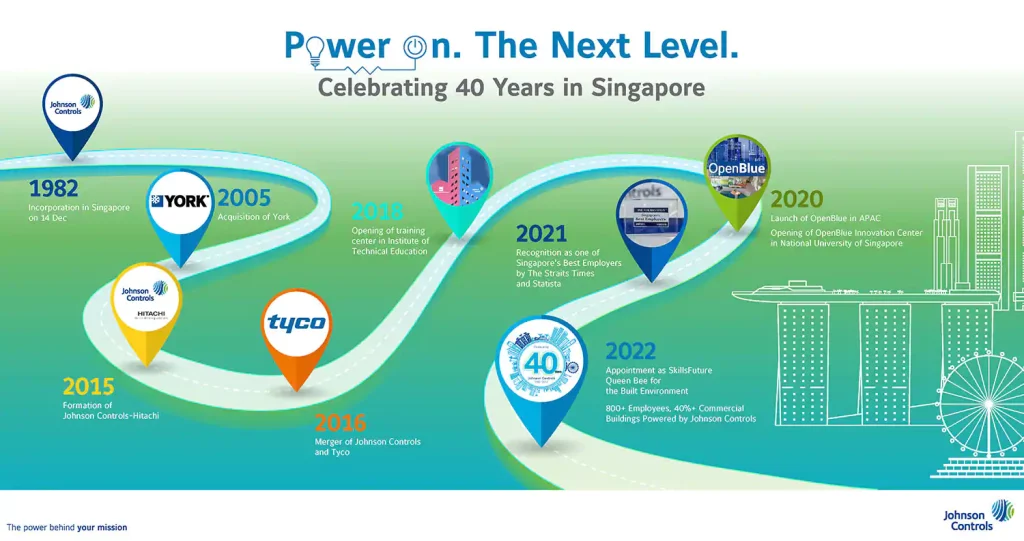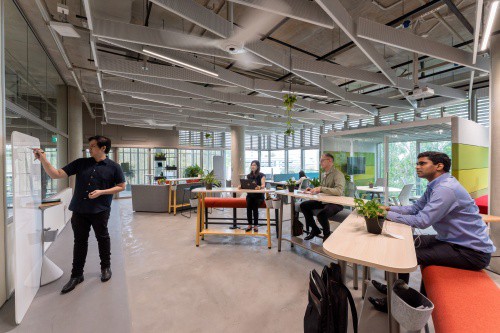Johnson Controls, maker of heating, ventilation, and air conditioning systems (HVAC) for commercial and residential buildings, recently reiterated its commitment to digital transformation as a key enabler for Singapore’s sustainability goals for the built environment.
In recent years, the company has stood at the forefront of innovation in a quest to make buildings smarter and more sustainable.

“Johnson Controls is grateful to have been part of our customers’ journey to achieving green buildings and is now ramping up towards super low energy and net zero buildings. Globally, we have nearly 140 years of experience in the built environment and are involved in many iconic projects – the latest being the World Cup stadiums in Qatar where a custom digital solution powered by our OpenBlue digital platform creates one unified command and control centre for all eight stadiums,” said Anu Rathninde, president, Asia Pacific, Johnson Controls.
Rathninde said this as the company marked the 40th year of its Asia Pacific regional headquarters in Singapore.
"The conducive business environment and progressive policies in the city have enabled us to experiment with newer solutions and models. This is one of the first markets in Asia Pacific where we launched our Johnson Controls capital financing that facilitates innovative as-a-service models such as healthy air as-a-service and net zero buildings as-a-service.”

Johnson Controls in Singapore has three locations and over 800 employees. Focusing on making the future more productive and sustainable through intelligent and smart buildings, Johnson Controls’ suite of smart building products and solutions have been installed in more than 40% of commercial buildings in the Lion City.
According to Peter Ferguson, general manager, Southeast Asia at Johnson Controls, the company is no stranger to city’s sustainability agenda and the Singapore Green Plan 2030.

“As a company, we have committed to achieve net zero emissions by 2040, ten years ahead of the Paris Agreement, with science-based targets to reduce our operational emissions by 55% and customers’ emissions by 16% by 2030. In Singapore, we have actively participated in the built environment ecosystem, including through partnerships with companies and educational institutions, which will serve as the pipeline to build up talents and capacity in parallel, especially in this brave, new, green economy,” said Ferguson.
Johnson Controls has ongoing partnerships with educational and training institutions including the National University of Singapore, the Institute of Technical Education (ITE) and SkillsFuture Singapore.
Appointed as the SkillsFuture Queen Bee for the Built Environment Facilities Management sector this year, Johnson Controls is now helping and mentoring small and medium-sized enterprises to develop digital capabilities to transform their businesses and kickstart their sustainability journeys. In the previous year, also in collaboration with SkillsFuture Singapore, Johnson Controls trained 34 mid-career individuals on digital transformation in the built environment under the SGUnited Mid-Career Pathways Programme – out of which four of the trainees secured full-time employment in Johnson Controls.
Another key development, in 2020, Johnson Controls launched the OpenBlue Innovation Center, located at the National University of Singapore, with the support of the Singapore Economic Development Board (EDB). A living laboratory, the centre has since served as a collaborative site for academics, students, industry leaders, small- and medium-sized enterprises and start-ups to innovate. Some achievements include:
- More than 300 use cases developed in the areas of sustainability, digitalisation and wellness through co-innovation and design workshops with industry players.
- By encouraging ecosystem partners in showcasing their work, seven start-up solutions have been deployed in the centre.




